Emergency HVAC maintenance is crucial for ensuring the comfort and safety of your home or business. When your heating, ventilation, and air conditioning (HVAC) system malfunctions, it can lead to uncomfortable temperatures, poor indoor air quality, and even health hazards. In this comprehensive guide, we will explore the importance of regular HVAC maintenance and provide you with essential tips for identifying and addressing common HVAC problems. We will also discuss the immediate steps to take in an HVAC emergency and when to hire professional HVAC services. Whether you are a homeowner or a business owner, this guide will help you protect your HVAC system and minimize downtime.
Understanding HVAC Systems
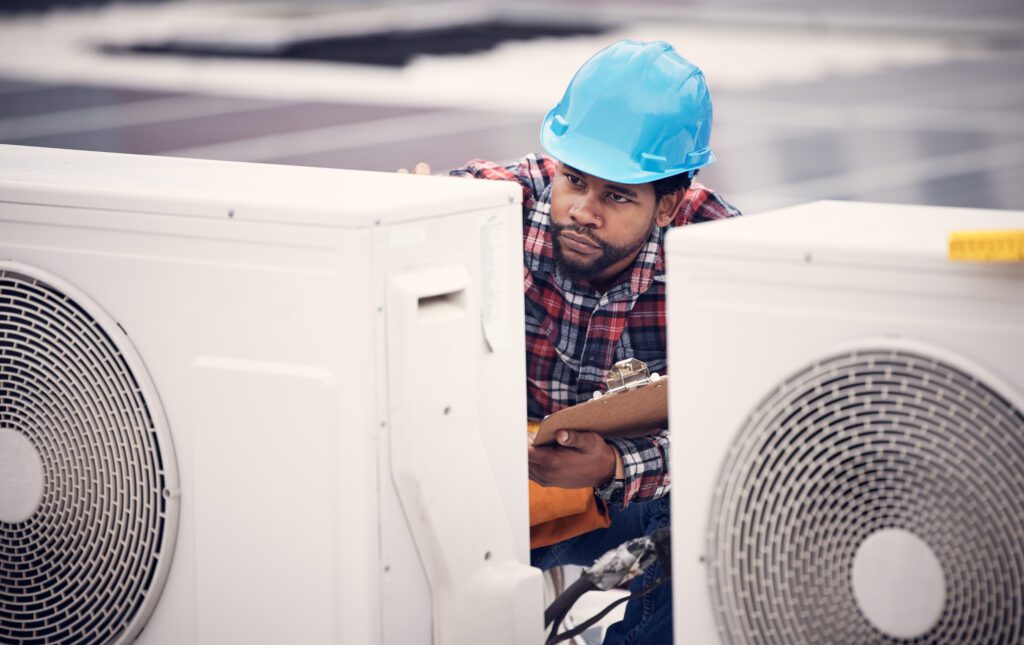
Before we delve into the details of emergency HVAC maintenance, let’s first gain a basic understanding of how HVAC systems work and their key components.
Heating, ventilation, and air conditioning (HVAC) systems are integral to maintaining a comfortable and healthy indoor environment. These systems are designed to regulate temperature, humidity, and air quality within a building, ensuring optimal conditions for occupants.
Basic Components of HVAC Systems
An HVAC system consists of various components that work together to provide heating, cooling, and ventilation. The main components include:
- Thermostat: This is the control panel that allows you to set the desired temperature.
- Furnace: The furnace heats the air in the winter.
- Air Conditioner: The air conditioner cools the air in the summer.
- Ventilation System: This system ensures fresh air circulation and removes stale air.
- Ductwork: Ducts distribute the conditioned air throughout the building.
- Air Filter: The air filter removes dust, allergens, and pollutants from the air.
Each component plays a crucial role in the overall functionality of the HVAC system. The thermostat serves as the brain of the operation, receiving input from sensors and regulating the system to maintain the desired temperature. The furnace and air conditioner work in tandem to adjust the temperature as needed, while the ventilation system ensures proper air circulation for comfort and health.
How HVAC Systems Work
To provide heating or cooling, an HVAC system relies on the exchange of air between the indoors and outdoors. It accomplishes this through various mechanisms, such as the compression and expansion of refrigerants, the combustion of fuel, and the use of fans and blowers. The process is controlled by the thermostat, which constantly monitors the temperature and adjusts the HVAC system accordingly.
Efficient HVAC systems not only enhance comfort but also contribute to energy savings and environmental sustainability. By understanding the basic components and operation of HVAC systems, individuals can better appreciate the importance of regular maintenance and professional servicing to ensure optimal performance and longevity of these essential systems.
Importance of Regular HVAC Maintenance
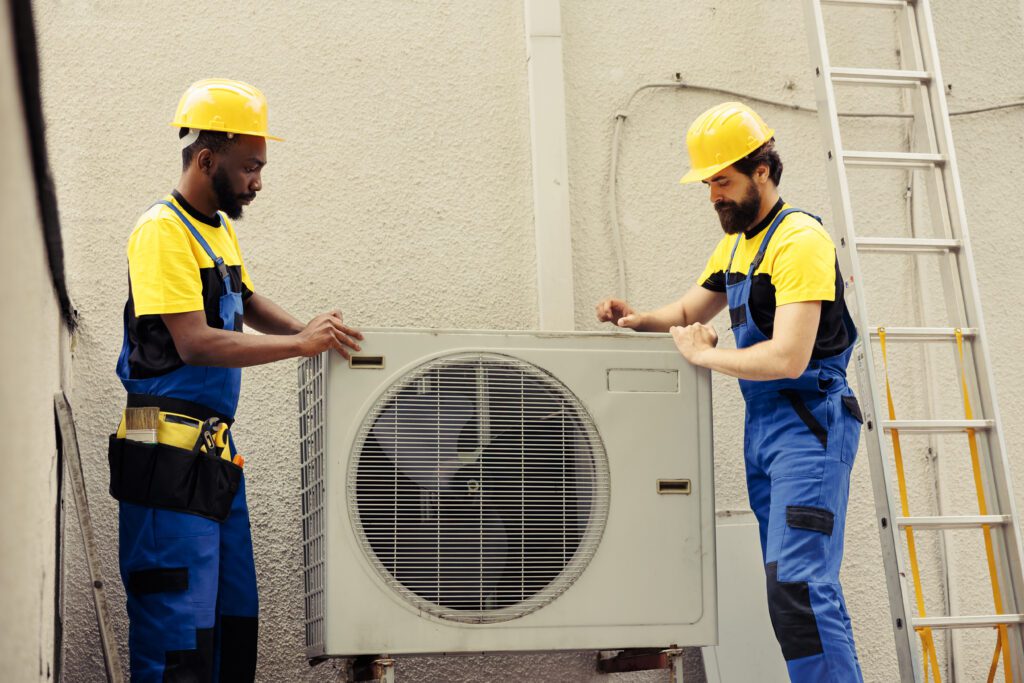
Regular HVAC maintenance is vital for keeping your system in optimal condition and avoiding unexpected breakdowns. By taking proper care of your HVAC system, you can:
Ensuring that your HVAC system receives regular maintenance is akin to providing it with a health check-up. Just as you would visit a doctor for routine check-ups to catch any potential health issues early, regular HVAC maintenance allows technicians to identify and address any minor issues before they escalate into major problems.
Moreover, scheduled HVAC maintenance can also help in maintaining good indoor air quality. Dust, debris, and other contaminants can build up in your system over time, leading to poor air quality in your home. By regularly cleaning and servicing your HVAC system, you can ensure that the air circulating in your home is clean and free of pollutants, promoting a healthier living environment for you and your family.
Extending the Lifespan of Your HVAC System
Like any mechanical system, the lifespan of an HVAC system depends on how well it is maintained. Regular maintenance helps prevent unnecessary wear and tear, allowing your system to operate efficiently for a longer period.
Ensuring Optimal Performance
A well-maintained HVAC system operates at peak performance, ensuring efficient heating and cooling throughout the year. This not only enhances your comfort but also reduces energy consumption and lowers utility bills.
Identifying Common HVAC Problems
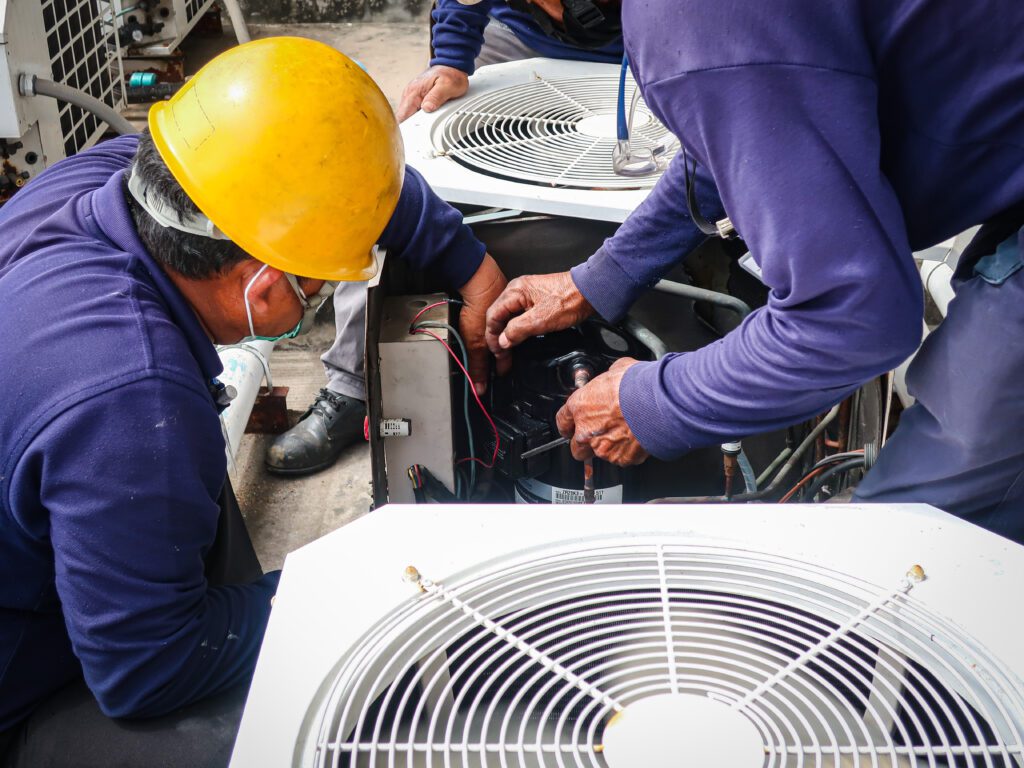
Understanding the signs and causes of HVAC problems can help you address issues promptly and prevent them from escalating into emergencies.
When it comes to your HVAC system, being proactive is key to maintaining a comfortable indoor environment. By staying vigilant and recognizing the early warning signs of potential issues, you can save yourself from costly repairs and uncomfortable living conditions.
Signs of HVAC Issues
Recognizing the signs of HVAC problems can help you intervene before the situation worsens:
- Irregular temperature fluctuations
- Loud or strange noises from the HVAC unit
- Uneven cooling or heating throughout the building
- Poor airflow from vents
- Increased energy bills
- Foul odors coming from the HVAC system
Irregular temperature fluctuations can indicate issues with your HVAC system’s ability to regulate temperature effectively. These fluctuations may be caused by a variety of factors, such as a malfunctioning thermostat or restricted airflow due to clogged filters or blocked ducts. Addressing these issues promptly can help maintain a consistent and comfortable indoor temperature.
Potential Causes of HVAC Problems
Common causes of HVAC problems include:
- Dirty or clogged filters
- Malfunctioning thermostat
- Refrigerant leaks
- Faulty electrical connections
- Worn-out fan belts
- Blocked ducts
Refrigerant leaks are a common issue that can lead to decreased cooling efficiency and potential damage to your HVAC system. If you notice a decline in cooling performance or ice buildup on the refrigerant lines, it may be a sign of a refrigerant leak. Addressing this issue promptly can help prevent further damage and ensure optimal performance from your HVAC system.
Emergency HVAC Maintenance Tips
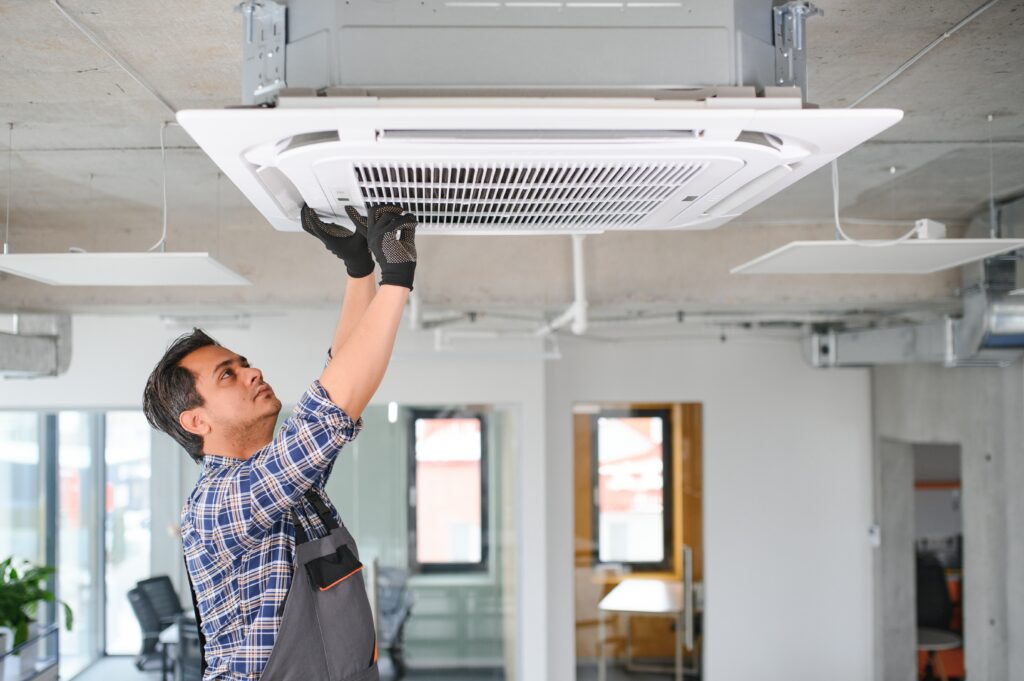
In an HVAC emergency, quick action is essential to prevent further damage and restore comfort. Here are important tips to remember:
When faced with an HVAC emergency, follow these steps:
- Turn off the HVAC system: Shutting down the system can prevent further damage and minimize risks.
- Check power supply: Ensure that the HVAC unit has power and that all connections are secure.
- Inspect the air filter: A dirty or clogged filter can contribute to HVAC issues. Clean or replace the filter if necessary.
- Clear the area around the HVAC unit: Remove any debris, leaves, or other obstructions that may hinder airflow or cause damage.
- Contact a professional HVAC service provider: If the problem persists or you are unsure how to proceed, it’s best to seek professional assistance.
Now, let’s delve deeper into each step to give you a better understanding of what to do in an HVAC emergency:
1. Turn off the HVAC system: When faced with an emergency, the first instinct may be to panic. However, it’s crucial to stay calm and take immediate action. Locate the main power switch or circuit breaker for your HVAC system and turn it off. This will help prevent any further damage and ensure the safety of everyone in your home or building.
2. Check power supply: After turning off the HVAC system, take a moment to inspect the power supply. Ensure that the unit is properly connected to a power source and that all connections are secure. Loose or damaged electrical connections can be a common cause of HVAC emergencies. If you notice any issues, it’s best to contact a professional HVAC technician to handle the repairs.
3. Inspect the air filter: A dirty or clogged air filter can significantly impact the performance of your HVAC system. It can restrict airflow, strain the system, and even lead to a complete breakdown. Take a moment to locate the air filter and inspect its condition. If it appears dirty or clogged, it’s essential to clean or replace it. Regularly maintaining and replacing air filters can help prevent emergencies and improve the overall efficiency of your HVAC system.
4. Clear the area around the HVAC unit: The area surrounding your HVAC unit should always be clear of any debris, leaves, or other obstructions. Over time, these materials can accumulate and hinder proper airflow, causing strain on the system and potentially leading to an emergency. Take a few minutes to remove any debris and ensure that the area around the unit is clean and unobstructed. This simple preventive measure can go a long way in preventing HVAC emergencies.
5. Contact a professional HVAC service provider: While you may be able to handle some HVAC issues on your own, it’s important to know when to seek professional assistance. If the problem persists after following the previous steps or if you are unsure about how to proceed, it’s best to contact a reputable HVAC service provider. They have the knowledge, experience, and specialized tools to diagnose and repair HVAC emergencies effectively.
Now that you know what to do in an HVAC emergency, let’s explore some preventive measures you can take to minimize the likelihood of a breakdown:
- Schedule regular maintenance: Routine inspections and maintenance by a professional HVAC technician can uncover potential issues and address them before they become emergencies. Regular maintenance can help extend the lifespan of your HVAC system and improve its overall performance.
- Keep the area around the HVAC unit clean: Regularly removing debris, foliage, and other materials that can obstruct airflow or damage the unit is essential. By keeping the area around the HVAC unit clean, you allow for proper airflow and reduce the risk of emergencies.
- Replace air filters regularly: Clogged filters restrict airflow and strain the HVAC system. It’s important to replace them according to the manufacturer’s recommendations. Regularly replacing air filters ensures optimal performance and helps prevent emergencies.
- Monitor performance: Pay attention to any unusual noises, odors, or significant changes in temperature and airflow. Addressing these issues promptly can prevent them from escalating into emergencies. If you notice anything out of the ordinary, it’s best to contact a professional HVAC technician for further inspection.
By following these preventive measures and knowing what to do in an HVAC emergency, you can minimize the likelihood of breakdowns and ensure the comfort and safety of your home or building.
Hiring Professional HVAC Services
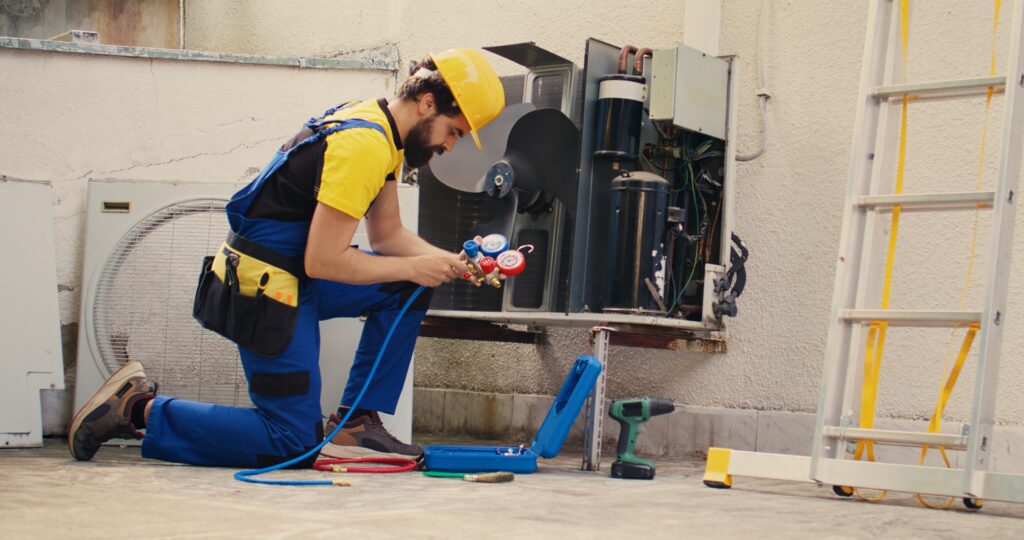
While some HVAC maintenance tasks can be performed by homeowners, certain issues require the expertise of professional HVAC service providers.
When to Call a Professional
You should consider calling a professional HVAC service provider in the following situations:
- Major breakdowns or system failures
- Refrigerant leaks or recharge
- Ductwork repairs or installations
- Electrical or wiring issues
- Complex thermostat problems
Choosing the Right HVAC Service Provider
When hiring a professional HVAC service provider, consider the following:
- Experience and reputation
- License and certifications
- Availability of emergency services
- References and testimonials
- Transparent pricing and warranties
In conclusion, emergency HVAC maintenance is an essential aspect of protecting your HVAC system and ensuring its optimal performance. By understanding the basic components of HVAC systems, identifying common problems, and following preventive measures, you can minimize the risk of emergencies and prolong the lifespan of your system. Remember to take immediate steps in an emergency and seek professional HVAC services when needed. Keeping your HVAC system in top shape will help you maintain a comfortable and healthy indoor environment.
Additionally, it’s important to note that regular maintenance of your HVAC system can also contribute to energy efficiency and cost savings in the long run. Professional HVAC service providers can offer maintenance plans that include routine inspections, cleaning, and tune-ups to keep your system running smoothly. These proactive measures can help prevent unexpected breakdowns and ensure that your system operates at peak performance levels.
Furthermore, when selecting an HVAC service provider, it’s beneficial to inquire about their knowledge of energy-efficient technologies and practices. By choosing a provider who stays updated on the latest advancements in HVAC systems, you can potentially benefit from improved energy efficiency, reduced carbon footprint, and lower utility bills. A reputable HVAC service provider will not only address your immediate repair needs but also offer recommendations for enhancing the overall efficiency and sustainability of your HVAC system.


